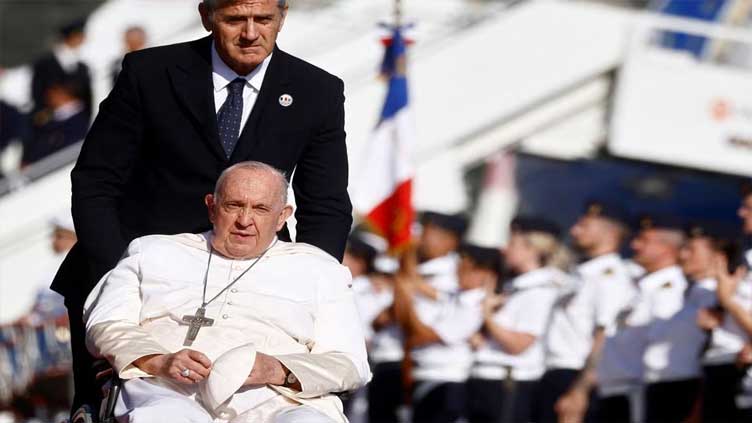Pope laments inhumanity faced by migrants

World
Pope laments inhumanity faced by migrants
MARSEILLE, France (Reuters) - Pope Francis arrived in the French port city of Marseille on Friday for a lightning visit that will centre on Europe's migration crisis, lamenting that migrants today face "a terrible lack of humanity".
While greeting individual journalists on the plane taking him to Marseille, one mentioned that his trip was taking place in the wake of a new surge of thousands of migrant arrivals last week at the Italian island of Lampedusa.
"It is cruelty, a terrible lack of humanity," he said, referring to the situation of the migrants in the Mediterranean in general.
Francis, who was greeted at the airport by Prime Minister Elisabeth Borne and will meet twice with President Emmanuel Macron on Saturday, is making the 27-hour trip to Marseille to conclude a meeting of Catholic young people and bishops from the Mediterranean area.
From the airport, he went to a prayer service with bishops, priests and nuns in the city's Notre-Dame-de-la-Garde cathedral, where he urged them to keep their churches and their hearts open to the most needy.
He was then due to pray and speak at a monument to the heroes and victims of the sea.
It will have echoes of Francis' first visit as pope - in 2013 to Lampedusa, where he paid tribute to migrants who died at sea and condemned "the globalisation of indifference".
Nearly, 130,000 migrants have arrived in Italy so far this year, according to government data, nearly double the figure for the same period of 2022.
That, Italy's right-wing Prime Minister Giorgia Meloni says, makes migration a problem for the entire EU, not just the burden of frontline receiving countries such as Italy, Malta and Spain.
SHARING THE BURDEN
While Francis has said often that migrants should be shared among the 27 EU countries, his overall openness towards migrants, including once calling their exclusion "scandalous, disgusting and sinful," has riled conservative politicians, not least in France.
"He behaves like a politician, or the head of an NGO, and not a pope," said Gilles Pennelle, general director of the far-right Rassemblement National party of Marine Le Pen, President Emmanuel Macron's main challenger in last year's presidential vote.
"I think that the Christian message is one of welcome on an individual level, but it (migration) is an immense political problem and whether or not to welcome migrants is for politicians to decide," he told Reuters in a telephone interview.
The French bishops deliberately chose the diverse port city for the week-long "Mediterranean Encounters" event. It has a long history of migration - particularly from Europe, the Middle East and North Africa - and the influences of these different cultures are still felt in its streets.
"It is a cosmopolitan city that has not completely embraced the French republican idea, where many keep their double-triple identities," Cesare Mattina, a sociologist at the University of Aix-Marseille, told Reuters in a telephone interview.
Marseille is a rare French city where migrant populations still live in the centre. Indeed, a former bishop of the city was fond of saying: "In Marseille you can go around the world in 80 hours, not 80 days," a play of words on the title of the Jules Verne novel.
But Marseille is no immigration utopia. The city has many of the problems that plague most urban centres - crime, drugs, racism and indifference.
The city's current archbishop, Cardinal Jean Marc Aveline, an Algerian-born Frenchman, said the meetings would also discuss social issues, economic disparities, the environment and climate change.
Macron is due to attend a papal Mass on Saturday, which has landed him in hot water with left-wing critics who say it violates the strict separation of state and faith, known as laïcité.
He has said he is going as a sign of respect for the pope.

